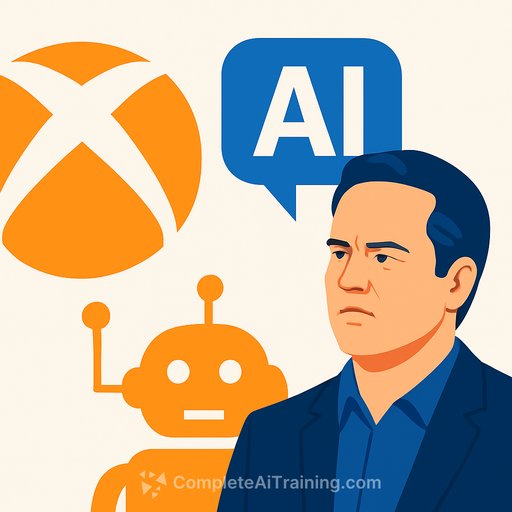Phil Spencer: Xbox Teams Aren't Being Forced to Use AI, and That's on Purpose
Microsoft's AI push has raised a logical question for game devs: will Xbox mandate AI across its studios? According to Phil Spencer, the answer is no. He says teams are not required to use AI, and generative AI isn't being applied to creative areas of game development.
This stance counters assumptions fueled by Microsoft's broader AI investments and last summer's layoffs. The message is clear: AI is optional for creative teams, and adoption will be organic, not top-down.
Where Xbox Uses AI Today: Operations and Safety
Spencer says AI is primarily deployed in security and safety-not content creation. His example: moderating network activity at scale, protecting child accounts, and enforcing controls set by parents or guardians.
It's not flashy, but it matters. At Xbox's scale, automated systems are required to keep communities safer and policies enforced.
- Policy and chat moderation at volume
- Network security and abuse detection
- Parental controls and protected account safeguards
If you want a reference point for this kind of work, Microsoft's safety guidance is a good baseline: Digital Safety at Microsoft and Xbox Community Standards.
No Mandates for Creative Teams
Spencer's view is pragmatic: teams adopt tools that truly make their jobs easier. Forcing a tool-AI or otherwise-usually backfires. So Microsoft makes tools available, then lets adoption spread organically.
His words: "Any top-down mandate that 'Thou must use a certain tool…' is not really a path to success." That applies to AI in the creative pipeline.
What This Means for Engineering and Studio Leads
- AI is fair game for ops. Treat moderation, safety, and telemetry as core automation candidates.
- Creative AI should prove its value. If a model doesn't reduce cycle time or raise quality, don't force it.
- Measure, don't assume. Run controlled pilots, compare baselines, and keep human review in critical loops.
- Respect content and data boundaries. Keep training data, licenses, and privacy policies airtight.
- Tooling should integrate, not interrupt. Favor plugins and services that fit your engine, DCCs, and CI/CD.
Practical AI Use Cases That Tend to Work (Optional, Opt-In)
- Operational: toxicity detection, fraud/cheat signals, anomaly alerts, and incident triage.
- Support: ticket routing, summarization, and player safety workflows.
- Dev efficiency: test data generation, build log summarization, and light scripting assistance.
Creative teams can experiment where it helps-rapid iteration on ideas, scripting helpers, or tooling glue-but there's no directive to push generative content into production.
Industry Pulse
A former PlayStation executive recently argued that AI in gaming is overrated-useful like Excel is to accountants: helpful, but not the core product. Spencer's comments line up with that measured approach.
Actionable Next Steps for Teams
- Focus AI on safety first: moderation, child protection, and incident response.
- Run small, scoped pilots for creative workflows; ship only where the data proves value.
- Define approval gates for AI output in art, code, and narrative.
- Document model usage, data sources, and licenses; review with legal and platform partners.
- Keep humans in the loop for any player-facing or brand-sensitive content.
Want structured, practical training?
If you're evaluating where AI fits in your stack without derailing production, this curated resource list can help: AI courses by leading AI companies.
Bottom line: Xbox is using AI where it's already essential-operations and safety. Creative use is opt-in, driven by real gains, not mandates.
Your membership also unlocks:






